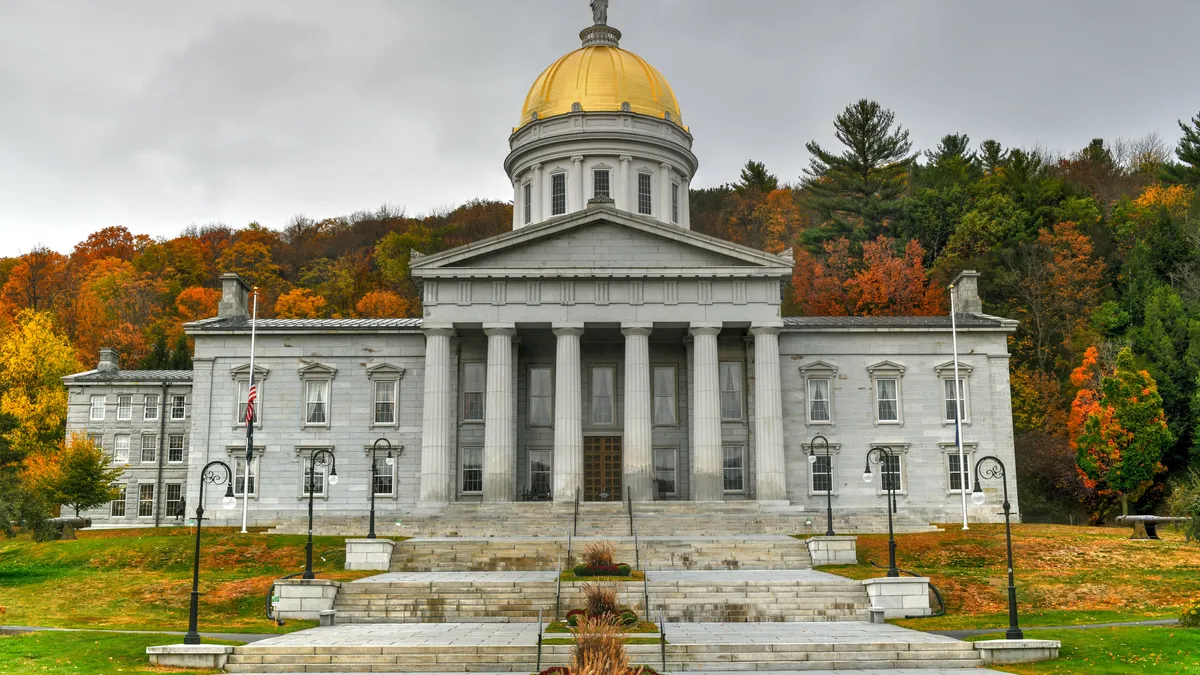Dive Brief:
- Vermont Gov. Phil Scott vetoed a bill on Thursday that would have expanded the state’s container deposit system, which was first established in 1973.
- The bill, H. 158, would have updated the legal definitions of “beverage” and “container” to include a wider range of products in the existing 5-cent deposit system by 2027. Wine bottles would have had a 15-cent deposit.
- The legislation also could have raised the handling fee, established a producer responsibility organization, set annual redemption rate goals, expanded the number of redemption locations and made various other changes.
Dive Insight:
Multiple state legislatures have considered expanding existing bottle bills, or passing new ones, but the concept is often opposed by certain companies in the recycling industry. Scott sided with the sector in his decision.
“I'm a long-time advocate of recycling and support a strong system to help Vermonters do so. But as I've consistently said, I believe expanding the labor intensive 1970s-era bottle deposit system would move us backwards, and we should instead focus on investing in and improving zero-sort (or blue bin) recycling,” said Scott in a June 29 veto letter, referring to single-stream recycling systems. Scott’s letter also cited the state’s 2012 Universal Recycling Law, which bans the disposal of certain beverage containers.
The governor’s decision was applauded by the National Waste & Recycling Association’s regional chapter, which represents major Vermont-based company Casella Waste Systems. The term “zero-sort” is a registered trademark of Casella.
“We thank Governor Scott for his leadership and veto,” said Lew Dubuque, vice president of chapter relations for NWRA. “We opposed this expansion because it would disrupt existing recycling infrastructure in the state and cause an economic burden to Vermont taxpayers.”
NWRA cited a prior study, conducted by RRS, that found bottle bills can raise overall recycling rates but potentially lead to lower revenue for MRFs because material is handled in a separate system.
The Vermont legislature has debated broader updates to the state’s bottle bill for multiple years, but aside from a 2022 law to create a category for “ready-to-drink spirits beverages” the system has not seen recent changes.
Supporters of such systems say that the broader recycling rate benefit is the most important factor. They have sought to expand existing bottle bills to include more types of containers and raise deposit values to 10 cents in many cases. Vermont’s expansion could have added categories such as wine, water, juice, hard seltzer, iced tea, coffee and sports drinks. Milk, dairy products, plant-based beverages, infant formula, meal replacement drinks and nonalcoholic cider would have been excluded.
The bottle bill currently covers categories like beer, liquor and carbonated non-alcoholic beverages.
“For over five decades, Vermont’s Bottle Bill program has reduced litter, increased recycling, and kept highly recyclable materials out of the state’s only landfill,” said Peter Blair, policy director for nonprofit Just Zero, in a statement. “This bill would have strengthened this already successful program and made it even more impactful. This is a missed opportunity, and we urge the legislature to override the veto.”
The Democrat-controlled legislature could potentially override Republican Scott’s veto with a two-thirds vote in each chamber.
Vermont is one of 10 U.S. states with a bottle bill, according to the Container Recycling Institute. While multiple states have made updates to their systems in recent years, few have made sweeping changes since Oregon doubled its deposit value to 10 cents, effective in 2017. Connecticut’s deposit is also moving to 10 cents in 2024. Supporters continue to push for new or expanded bottle bill legislation in multiple states, while major recycling companies are generally opposed to such efforts.











